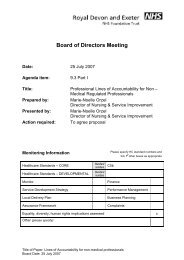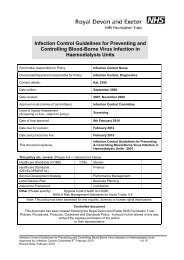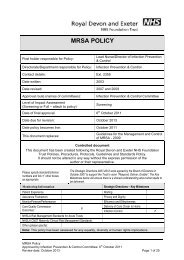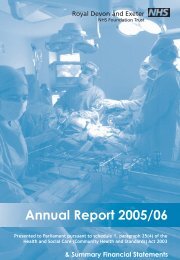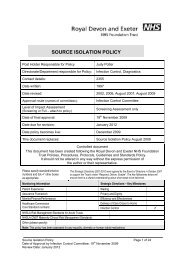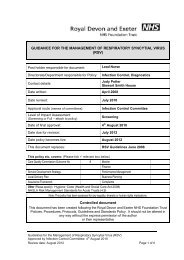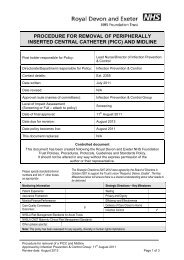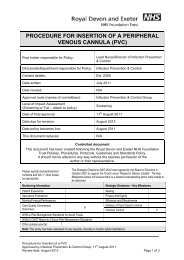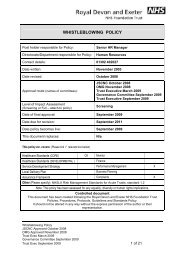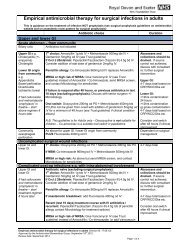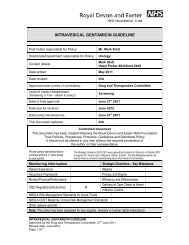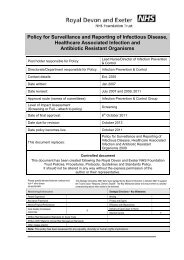Annual Report and Accounts 2012/13 - Royal Devon & Exeter Hospital
Annual Report and Accounts 2012/13 - Royal Devon & Exeter Hospital
Annual Report and Accounts 2012/13 - Royal Devon & Exeter Hospital
Create successful ePaper yourself
Turn your PDF publications into a flip-book with our unique Google optimized e-Paper software.
102 5. Our Governors <strong>and</strong> Members<br />
<strong>Royal</strong> <strong>Devon</strong> <strong>and</strong> <strong>Exeter</strong> NHS Foundation Trust<br />
<strong>Annual</strong> <strong>Report</strong> <strong>and</strong> <strong>Accounts</strong> <strong>2012</strong>/<strong>13</strong><br />
Our Governors <strong>and</strong> Members<br />
Council of Governors<br />
The Council of Governors (CoG)<br />
is an important part of the Trust’s<br />
governance structure. Individual<br />
Governors <strong>and</strong> the Council as a whole<br />
have continued to add real value to the<br />
Trust during the course of the year. As<br />
a long-st<strong>and</strong>ing Foundation Trust, the<br />
work of the Governors has evolved,<br />
<strong>and</strong> continues to evolve over time. The<br />
work undertaken by the Governors<br />
themselves in shaping their own role<br />
over the last few years has gone a long<br />
way in enabling the Council to play an<br />
important role, acting as both a critical<br />
friend <strong>and</strong> a conduit of member views.<br />
This increasing maturity as a collective<br />
body is demonstrated best in the way<br />
in which the CoG has become much<br />
more central in conducting its own<br />
affairs, ensuring that it is playing an<br />
effective role <strong>and</strong> holding individual<br />
Governors <strong>and</strong> Groups accountable.<br />
In spending time on clarifying its<br />
purpose <strong>and</strong> how the role will be put<br />
into practice, the Trust’s Governors<br />
have effectively done a great deal<br />
to foreshadow the subsequent<br />
clarification of the Governor's role<br />
that has emerged through the Health<br />
& Social Care Act <strong>2012</strong>. This has put<br />
the RD&E’s CoG in a good position<br />
to continue its own development in<br />
line with the new powers provided to<br />
Governors in the new Act.<br />
Governors themselves define their core<br />
role as follows:<br />
• Representing the interests<br />
of the Members <strong>and</strong> partner<br />
organisations in the local health<br />
economy<br />
• Holding the Board collectively to<br />
account for the performance of<br />
the Trust<br />
• Feeding back information about<br />
the Trust to constituencies <strong>and</strong><br />
stakeholder organisations.<br />
As reported last year, to take forward<br />
its key functions, the Governors<br />
established three new task groups on:<br />
a. Enhancing the effectiveness<br />
of CoG<br />
b. Patient Safety <strong>and</strong> Quality aligned<br />
to the Engagement <strong>and</strong> Experience<br />
Committee work programme<br />
c. Member <strong>and</strong> Public Engagement.<br />
These groups are responsible for<br />
identified elements of the agreed<br />
consolidated CoG business plan <strong>and</strong><br />
provide a Governor perspective on<br />
key issues within the groups’ remit<br />
(i.e. they do not undertake executive<br />
functions that are the remit of the<br />
Trust).<br />
The groups have a convenor <strong>and</strong> a core<br />
group but are open to any member of<br />
CoG that wishes to participate. The<br />
task groups’ convenors are the three<br />
Governors who currently represent the<br />
CoG on the Engagement & Experience<br />
Committee providing an essential<br />
link between the Trust’s governance<br />
structure <strong>and</strong> the Governors. The<br />
groups are accountable directly to<br />
the Council of Governors <strong>and</strong> the<br />
convenors report on progress <strong>and</strong><br />
outcomes to every CoG meeting.<br />
The Governor’s Coordinating Group,<br />
which comprises the Chairman, the<br />
Lead Governor (<strong>and</strong> Deputy), the<br />
convenors of the three task groups,<br />
a staff governor representative <strong>and</strong><br />
FT secretariat staff, meets every two<br />
months <strong>and</strong> focuses on coordinating<br />
the work of the CoG <strong>and</strong> ensuring<br />
that progress is being made against<br />
the plan <strong>and</strong> facilitating co-operation<br />
between the CoG <strong>and</strong> the Board of<br />
Directors.<br />
During <strong>2012</strong>/<strong>13</strong>, these groups have<br />
been busy implementing programmes<br />
of work linked to Governors' key roles<br />
<strong>and</strong> stated priorities.<br />
The focus on implementation marks<br />
a significant transition from a time<br />
when Governors worked hard to better<br />
underst<strong>and</strong> the role <strong>and</strong> how they<br />
could contribute, to a position now<br />
in which the more inward-looking<br />
processes have been replaced by much<br />
greater clarity <strong>and</strong> a determination to<br />
add value.<br />
The following section sets out some<br />
of the key highlights for each of these<br />
groups over the year.



